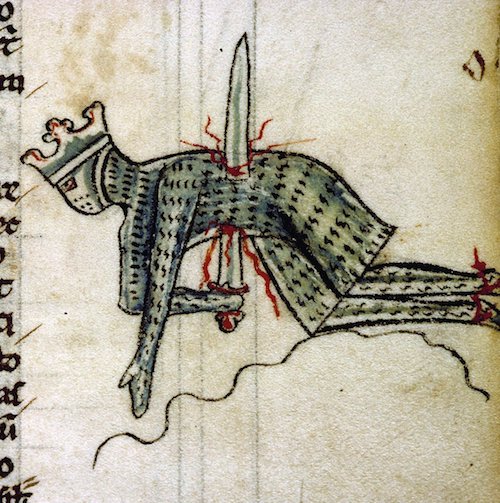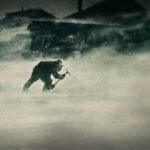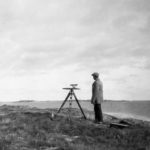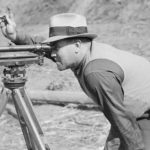We run our website the way we wished the whole internet worked: we provide high quality original content with no ads. We are funded solely by your direct support. Please consider supporting this project.

God’s Non-Violent Ideal in the OT
While God condescended to working within the violent-prone, fallen framework of his people in the Old Testament—as I argue in Crucifixion of the Warrior God—the OT is also full of references to how God worked to preserve his non-violent ideal as much as possible. He did this by continually reminding his people not to place any trust in the sword, but to rather place all their trust him.
For example, as Judah was facing impending doom, the Lord told Hosea that he would save them “not by bow, sword or battle, or by horses and horsemen, but I the LORD their God will save them” (Hos 1:7).
So too, through the Psalmist the Lord encourages his people by saying:
Do not put your trust in princes,
in human beings, who cannot save.
When their spirit departs, they return to the ground;
on that very day their plans come to nothing.
Blessed are those whose help is the God of Jacob,
whose hope is in the LORD their God (Ps. 146:3-5).
Along these same lines, it was undoubtedly to buttress his people’s trust in him rather than the sword that the Lord instructed his people ahead of time that, if and when they rebelliously decide to have a king, they should not allow him to amass a large army (Deut. 17:16). For while “[s]ome trust in chariots and some in horses,” Israelites were to “trust in the name of the LORD our God” (Ps. 20:7).
Despite all appearances to the contrary, the Psalmist is convinced that “[n]o king is saved by the size of his army” and “no warrior escapes by his great strength.” Yet, “the eyes of the LORD are on those who fear him” and whose “hope is in his unfailing love” to “deliver them from death” (Ps. 33:16-19). Because he trusts in the Lord, another writer confesses, “I put no trust in my bow, my sword does not bring me victory” (Ps. 44:6). And despite his sinful proclivity to trust in armies, even David was, at least at one point, confident that “it is not by sword or spear that the LORD saves” (I Sam. 17:47).
While the Lord frequently promised to bless those who trusted in him, he also frequently pronounced woe on all who instead chose to find their security in the sword. Hence, for example, to the Israelites who were seeking protection from Assyria by forging military alliances with Egypt, the Lord declared:
Woe to those who go down to Egypt for help,
who rely on horses,
who trust in the multitude of their chariots
and in the great strength of their horsemen,
but do not look to the Holy One of Israel,
or seek help from the LORD (Isa 31:1).
Similarly, through Hosea the Lord tells his people that they “have planted wickedness” and “have eaten the fruit of deception” because “you have depended on your own strength and on your many warriors.” For this reason, he says, “your fortresses will be devastated” and “mothers” will be “dashed to the ground with their children” (Hos. 10:13-14). The passage clearly reflects God’s accommodation to Hosea’s interpretation of how this will happen, for Hosea depicts God being directly behind this atrocity. Yet, the passage nevertheless bears witness to God’s true desire for his people to place no trust in military might.
Along these lines, David was punished precisely because he gave into Satan’s temptation to calculate how much military power he had (1 Chron. 21). It’s also interesting to note that, despite the fact that Yahweh is frequently depicted as helping David successfully wage war against the Philistines and other threatening nations, he nevertheless refused to allow David to build his temple because, he said, “you are a warrior” who has “shed much blood on the earth in my sight” (I Chron. 22:8; 28:3).
Given that the temple was regarded as the place where God uniquely dwelt, this prohibition bears witness to the fact that, while the incarnational God was not above condescending to wear the mask of a violent ANE warrior deity as he furthered his sovereign purposes through David, this is not where he actually lives. His true tabernacle, manifested perfectly in Jesus Christ in whom he fully dwelt (Jn 1:14), is rather characterized by self-sacrificial love and the shunning of all violence.
Image: Suicide of Saul, Bible, England 13th century (Angers, Bibliothèque municipale, ms. 9, fol. 62r)
Category: General
Tags: Cruciform Theology, Nationalism, Non-Violence
Topics: Enemy-Loving Non-Violence
Related Reading

Podcast: How Do You Recommend Reading the Bible to Kids?
Greg looks at reading the Bible to kids and considers where in the Bible one should start reading. http://traffic.libsyn.com/askgregboyd/Episode_0311.mp3

Podcast: What is ‘Deep Literalism’?
Greg discusses different levels of literalism and does a darn good impersonation of Garth Brooks. http://traffic.libsyn.com/askgregboyd/Episode_0214.mp3

Did God Destroy Sodom and Gomorrah? (podcast)
Greg considers the destruction of Sodom and Gomorrah and speculates on the nature of the angels who were sent there. Episode 597 http://traffic.libsyn.com/askgregboyd/Episode_0597.mp3

Podcast: Where is the Foundation of Our Trust in the Old Testament?
Greg looks at what he considers the foundation of trusting in the Bible. http://traffic.libsyn.com/askgregboyd/Episode_0310.mp3

Blessing the Soldiers of ISIS
In light of the overwhelming response to Greg’s post about loving the soldiers of ISIS, we thought we would explore Jesus’ teaching on this topic further. The following is an excerpt from Myth of a Christian Religion. The perspective below stands in contrast to the perspectives exhibited by many Christians, one being the recent article…

Podcast: What About Guns?
Greg shoots straight in this controversial episode on guns. He also tells the tale of the time he shot the German Luger. Also, Dan corrupts the youth (as per typical). http://traffic.libsyn.com/askgregboyd/Episode_0219.mp3 Image from www.quotecatalog.com
